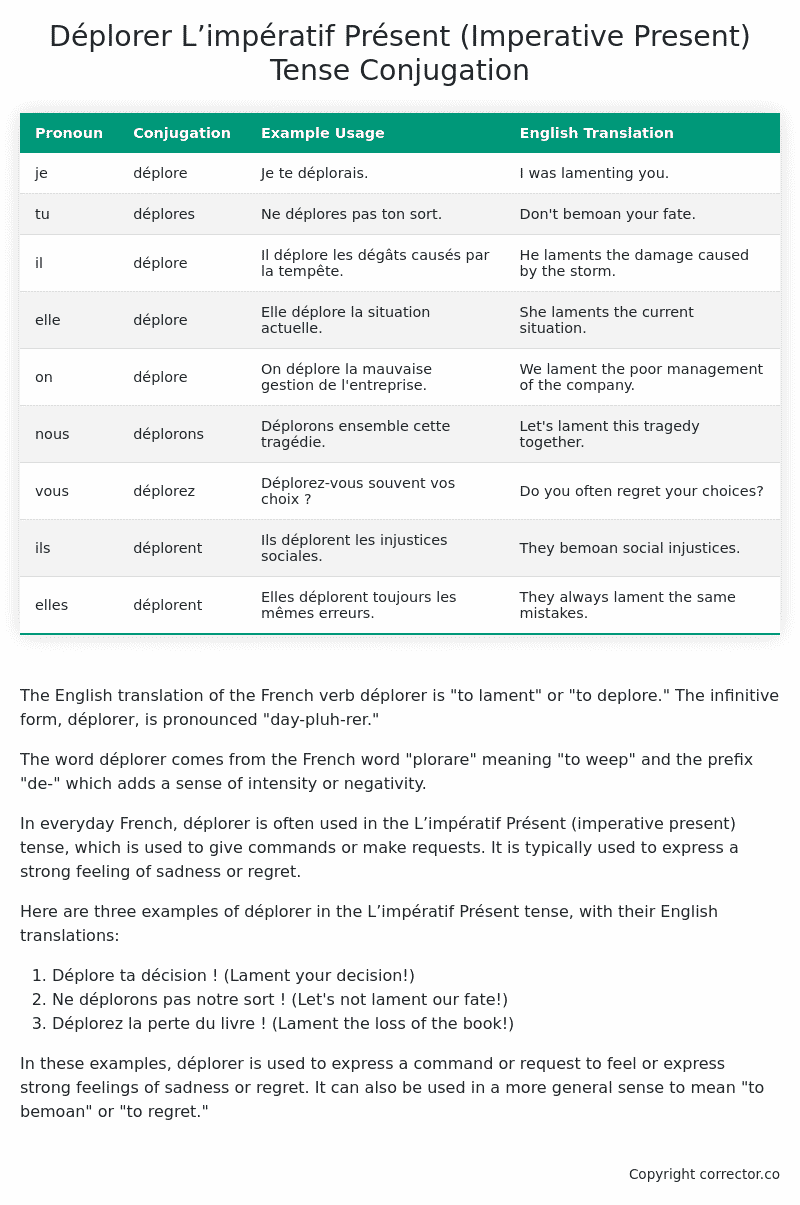L’impératif Présent (Imperative Present) Tense Conjugation of the French Verb déplorer
Introduction to the verb déplorer
The English translation of the French verb déplorer is “to lament” or “to deplore.” The infinitive form, déplorer, is pronounced “day-pluh-rer.”
The word déplorer comes from the French word “plorare” meaning “to weep” and the prefix “de-” which adds a sense of intensity or negativity.
In everyday French, déplorer is often used in the L’impératif Présent (imperative present) tense, which is used to give commands or make requests. It is typically used to express a strong feeling of sadness or regret.
Here are three examples of déplorer in the L’impératif Présent tense, with their English translations:
- Déplore ta décision ! (Lament your decision!)
- Ne déplorons pas notre sort ! (Let’s not lament our fate!)
- Déplorez la perte du livre ! (Lament the loss of the book!)
In these examples, déplorer is used to express a command or request to feel or express strong feelings of sadness or regret. It can also be used in a more general sense to mean “to bemoan” or “to regret.”
Table of the L’impératif Présent (Imperative Present) Tense Conjugation of déplorer
| Pronoun | Conjugation | Example Usage | English Translation |
|---|---|---|---|
| je | déplore | Je te déplorais. | I was lamenting you. |
| tu | déplores | Ne déplores pas ton sort. | Don’t bemoan your fate. |
| il | déplore | Il déplore les dégâts causés par la tempête. | He laments the damage caused by the storm. |
| elle | déplore | Elle déplore la situation actuelle. | She laments the current situation. |
| on | déplore | On déplore la mauvaise gestion de l’entreprise. | We lament the poor management of the company. |
| nous | déplorons | Déplorons ensemble cette tragédie. | Let’s lament this tragedy together. |
| vous | déplorez | Déplorez-vous souvent vos choix ? | Do you often regret your choices? |
| ils | déplorent | Ils déplorent les injustices sociales. | They bemoan social injustices. |
| elles | déplorent | Elles déplorent toujours les mêmes erreurs. | They always lament the same mistakes. |
Other Conjugations for Déplorer.
Le Present (Present Tense) Conjugation of the French Verb déplorer
Imparfait (Imperfect) Tense Conjugation of the French Verb déplorer
Passé Simple (Simple Past) Tense Conjugation of the French Verb déplorer
Passé Composé (Present Perfect) Tense Conjugation of the French Verb déplorer
Futur Simple (Simple Future) Tense Conjugation of the French Verb déplorer
Futur Proche (Near Future) Tense Conjugation of the French Verb déplorer
Plus-que-parfait (Pluperfect) Tense Conjugation of the French Verb déplorer
Passé Antérieur (Past Anterior) Tense Conjugation of the French Verb déplorer
Futur Antérieur (Future Anterior) Tense Conjugation of the French Verb déplorer
Subjonctif Présent (Subjunctive Present) Tense Conjugation of the French Verb déplorer
Subjonctif Passé (Subjunctive Past) Tense Conjugation of the French Verb déplorer
Subjonctif Imparfait (Subjunctive Imperfect) Tense Conjugation of the French Verb déplorer
Subjonctif Plus-que-parfait (Subjunctive Pluperfect) Tense Conjugation of the French Verb déplorer
Conditionnel Présent (Conditional Present) Tense Conjugation of the French Verb déplorer
Conditionnel Passé (Conditional Past) Tense Conjugation of the French Verb déplorer
L’impératif Présent (Imperative Present) Tense Conjugation of the French Verb déplorer (this article)
L’infinitif Présent (Infinitive Present) Tense Conjugation of the French Verb déplorer
Struggling with French verbs or the language in general? Why not use our free French Grammar Checker – no registration required!
Get a FREE Download Study Sheet of this Conjugation 🔥
Simply right click the image below, click “save image” and get your free reference for the déplorer L’impératif Présent tense conjugation!

Déplorer – About the French L’impératif Présent (Imperative Present) Tense
Usage
Giving commands
Making requests
Offering advice
Expressing desires
Conjugation Formation
Interactions with other tenses
Want More?
I hope you enjoyed this article on the verb déplorer. Still in a learning mood? Check out another TOTALLY random French verb conjugation!


